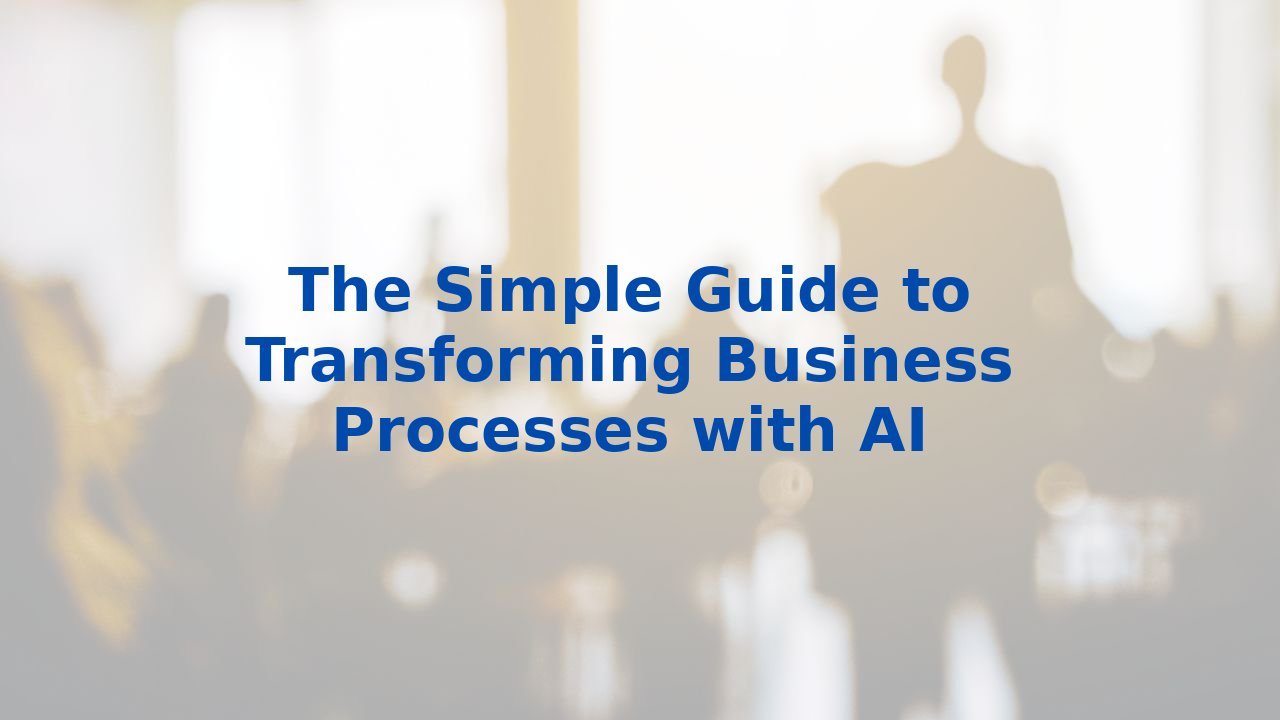The Simple Guide to Transforming Business Processes with AI
The Simple Guide to Transforming Business Processes with AI
Introduction
In the ever-evolving landscape of business, the integration of Artificial Intelligence (AI) stands as a defining factor that shapes operational efficiency and innovation. As organizations look for ways to thrive in competitive markets, harnessing the power of AI not only streamlines processes but fundamentally redefines how companies approach everyday challenges. This guide will explore how AI can enhance key business processes, offering insights into its transformational capabilities.
Redefining Business Processes with AI
Automation and Operational Efficiency
One of the most profound impacts of AI on business is its ability to automate repetitive, rule-based tasks. Think about the myriad of processes—from data entry to invoice processing—that consume invaluable time and resources. By automating these tasks, AI frees up employees to engage in higher-value work, whether it be strategic planning or creative problem-solving. Imagine your team focusing on innovation instead of getting bogged down by manual labor. This shift not only boosts productivity but also ensures that operations are executed with greater precision and consistency.
Advanced Data Analytics
In a world where data is the new gold, AI provides organizations with the tools to mine insights from vast amounts of information. With advanced machine learning algorithms and natural language processing, companies can extract actionable insights, identify patterns, and even predict future trends. This level of analysis supports informed decision-making, empowering businesses to optimize inventory levels, enhance supply chain operations, and anticipate customer needs more effectively.
Customer Experience Personalization
Another transformative aspect of AI lies in its ability to personalize the customer experience. Through intelligent systems, such as chatbots and tailored marketing strategies, businesses can engage with customers on a personal level, adapting to their preferences and addressing queries instantly. This fosters a sense of loyalty among customers, driving satisfaction and ultimately improving business outcomes—a win-win for both customers and organizations.
Innovation and Product Development
AI does not just improve existing processes; it also fuels innovation in product development. By optimizing development cycles and anticipating market needs more accurately, companies can bring ideas to market faster than ever before. In roles like human resources, AI can streamline hiring processes by automating resume screening and initial candidate assessments. When HR professionals are not bogged down by repetitive tasks, they can focus on strategic initiatives that help shape a thriving organizational culture.
Benefits of AI Integration
Improved Efficiency
The benefits of integrating AI into business processes are manifold, the most notable being a dramatic increase in efficiency. By reducing operational costs and minimizing human error, AI enables teams to perform at the peak of their potential. The result? More creativity and better quality outcomes as people shift from mundane tasks to impactful contributions.
Enhanced Decision-Making
Data-driven insights produced by AI extend far beyond what humans can process manually. The ability to analyze large datasets quickly leads to better anticipation of future trends, allowing businesses to pivot strategies proactively rather than reactively. In an age defined by rapid change, having a keen understanding of the market can spell the difference between leading the pack or falling behind.
Competitive Advantage
Successfully integrating AI isn't just about keeping up with the competition; it paves the way for seizing new opportunities. Organizations that leverage AI can innovate more swiftly, enhance customer service, and ultimately improve their profitability. This agility ensures they remain responsive to market dynamics, establishing a firm competitive edge.
The Importance of Employee Training
Of equal importance, however, is the need for employee training in AI technologies. A workforce that understands how to utilize AI tools can amplify the technology's benefits, resulting in a collaborative environment that thrives on innovation. Here’s why training employees in AI is crucial:
- Skill Development: Equipping employees with AI skills empowers them to contribute actively to enhancing organizational efficiency.
- Adaptability: As AI technologies evolve, trained employees can pivot gracefully to new tools and processes, maintaining the organization’s agility.
- Job Security: Familiarity with AI applications reinforces job security, especially as roles evolve alongside technology.
- Innovation: Trained employees are often the source of new ideas and solutions, fostering a culture of continuous improvement.
Conclusion
Embracing AI within business processes is not just a trend—it's a substantial opportunity for transformation. By automating routine tasks, enhancing data analysis, personalizing customer interactions, and stimulating product innovation, AI is paving the way for a smarter way of doing business. When accompanied by focused employee training, organizations position themselves not only to maximize these innovations but also to secure their relevance in an increasingly competitive landscape. As AI technology continues to evolve, its influence on business processes will only grow, leading the way toward a more intelligent and adaptable future.



